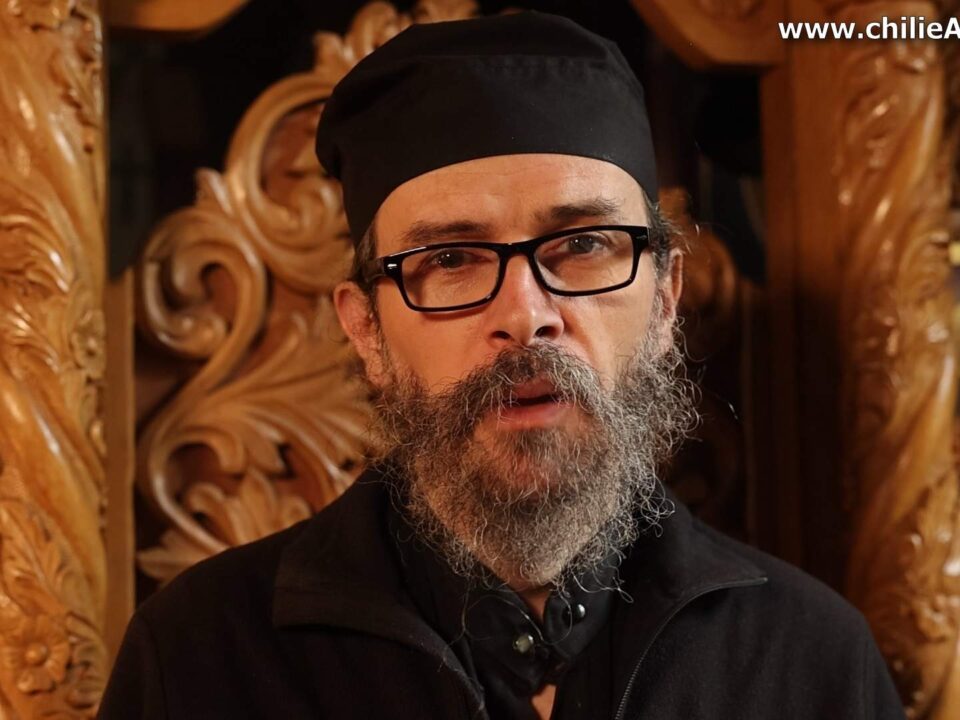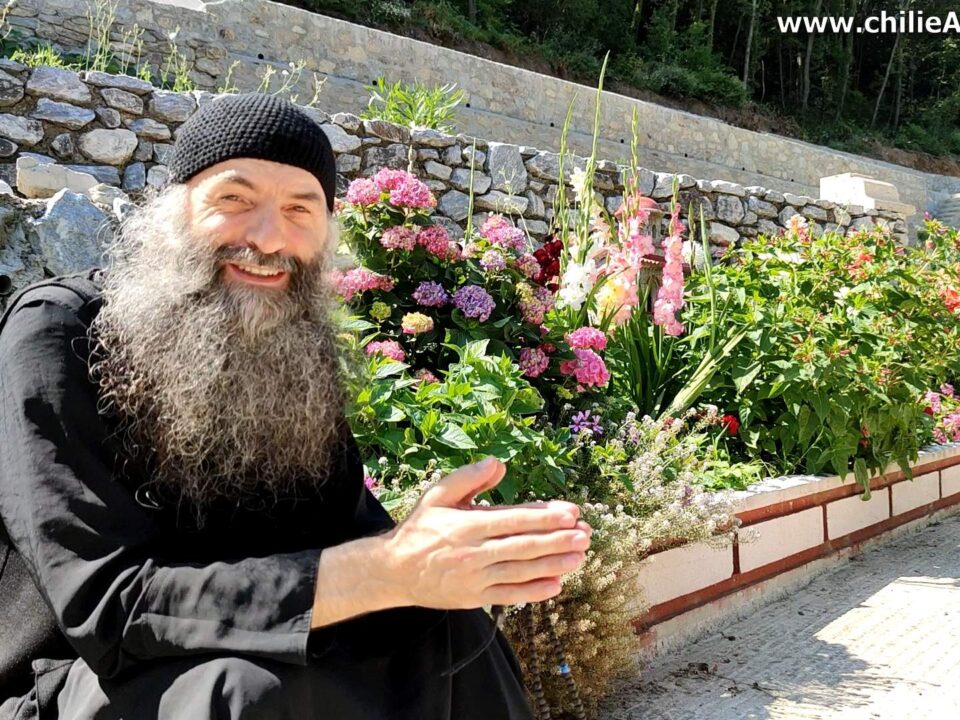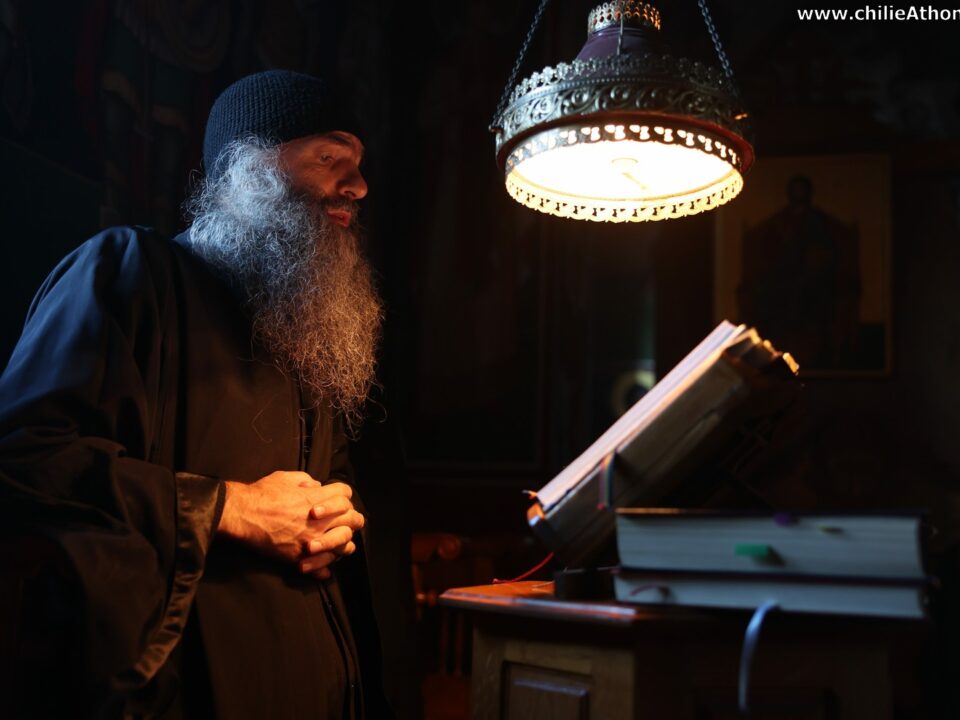
Holy Tradition and Today’s Youth – Silvian Man, Fr. Theologos
21 August 2022
Miracles in Programming, Artificial Intelligence and the Family – Father Theologos
28 August 2022We talked about obedience and its beneficial effects.
Now we will talk about disobedience and its destructive effects, about handling reproofs from both the perspective of those who reproof and from the perspective of those who are reproofed.
Related to this, we will also touch on the theme of tyranny and its repercussions.
Enjoy!
Glory to the Father and to the Son and to the Holy Spirit, now and forever and ever. Amen.
For the prayers of our Holy Fathers, Lord Jesus Christ, Son of God, have mercy on us. Amen
Now I would like to talk about something very familiar to us in the twenty-first century. In our series on obedience as we talked about obedience and its effects, now we are going to talk a little bit about disobedience and its effects.
Good – if the effects of obedience are peace, love, unity with all through God and with God – a state that translates into the abyss of humility and lack of anger in face of reproaches – a state of continuous happiness, brothers, and restful activity, in continuous rest, as I said – the rest of love. A very active state.
Disobedience, on the other hand, is exactly the opposite: disobedience is breaking, war, tearing apart – schism. In Greek the word “schism” means tearing, tearing – “schizo” means to break, to tear. Let us not, good people, cut ourselves off from the Church, from the body of Christ! Understand? God forbid!
This is what all the Holy Fathers wrote about: disobedience to God being the severance from the source of existence, from the source of love, from the source of unity that is God. Because of this, it means that the one who disobeys Him is not punished in the legalistic sense—that is, gets beaten by God and His police, so to speak. There is even the expression “God does not beat with a club” among the people.
It is about the fact that man himself, by detaching himself from the source of existence, from the right way of being, struggles. This is the result of disobedience. God is purely existential, and man punishes himself the moment he disobeys God. This is hell, brothers— breaking away from the source of existence, from the source of unity, from the source of love. So those who break away from Christ are not capable of love, of unity, of acceptance, of obedience.
St. Ephraim Katunakiot – one of the great contemporary saints of the Holy Mountain – says that obedience is life, disobedience is death. That’s right, but we, who have fell so low starting with the fall of Adam, being slaves to passions, disobey.
We all disobey, brothers, because we are all slaves.
We use our freedom wrongly, that is, by losing it to become slaves to passions. In fact, know that all the asceticism of the Church, all the commandments of Christ are given to ensure our freedom.
So the Church is the keeper and guarantor of freedom. Understand? This is what all the commandments are given for, for freedom. Freedom is not achieved, so to speak, democratically, by marching on the streets, but by escaping passions. Of course, sometimes, well, it can get there, but that’s another story. It’s totally secondary.
So the law of liberty in Christ, brothers, we learn from Holy Scripture and from the Holy Fathers. The experience of this freedom, however, we feel it with the fulfilling of the commandments, with the application in time of this therapeutics that is called Orthodoxy, as I said.
Unfortunately, no one is perfect in doing the commandments and so perfection is mysteriously hidden in the Cross. Brothers, we all need the Cross. That’s not what I said, elder Mark said it.
So we all need the Cross, we all need to go through trouble. It cannot be otherwise. We all sin, we all feel sinful pleasure, so we need an analogous pain to restore balance.
This pain can be inflicted on man alone by condemning himself, confessing and asking for forgiveness – all these actions show that we repent. If man does not repent, then the spiritual law allows an external pain to come, analogous to his sin, his disobedience.
Because the pain that comes through spiritual law is always greater than the pain that man inflicts on himself or voluntarily, because of this ascetics or spiritual leaders – abbots and even bodily parents in the past, yes – generated pain.
Spiritual people generated pain on themselves, that is, they rebuked themselves, they condemned themselves if their conscience rebuked them, they rebuked themselves if their conscience rebuked them – that is, they actually collaborated with their conscience to rebuke the old man. It rebuked his conscience, they rebuked themselves.
Very related to this, with the same mechanism, but on a parallel side, we have the rebuke that the leaders – that is, the abbots, the parents or, well, even the hierarchical bosses, the directors rebuke us. Understand? The superior.
This pain has— or, well—should have the effect of extirpating the sinful pleasure we felt at the moment of committing sin and/or pushing man forward spiritually. I said “or” because sometimes it is good to rebuke or be chastised even if we do not commit very big sins, but only and only to push ourselves forward. Understand? We also need to push ourselves forward, not just repent for sins we have committed.
Yes, ok, know that I say somewhat hesitantly that “we don’t commit very big sins” because self-sufficiency, self-love is a very big sin, brothers.
Ok, good – so I think things are clear by now. Yes, they are and not really. Because here we have certain problems: it is, in fact, about the very low resistance of the human soul to reproach, to chastisement if it is not supported by a special grace from God. It usually needs the support of God’s people, not just grace directly from God.
Because grace directly from God, being sinners, we do not have it to a very large extent. So for this reason, let us rebuke ourselves with all sincerity and determination for deserving it, but also with great care not to fall into despair. That we can’t resist! Saint Silouan said, “Keep your mind in hell and do not despair.” Great, great attention here to brothers – or rather, sisters because, mainly, ladies and, especially, ladies get discouraged easily. Not to be! Courage! Courage! Courage! You have no blessing to lose courage! You have no blessing!
St. John Chrysostom says that if the devil succeeds in making us sin, he has won a battle. Higher or lower depending on the seriousness of the sin. If he managed to make us lose courage, he won the war. Let us never lose courage! If we see that we are losing it, let us seek help from people who are validated as people of God. Understand?
That is, to confess, to seek spiritual word, to seek someone whom God validates before us.
Let’s not forget that Judas is at the bottom of hell not because he sold Christ. In fact, the Holy Fathers say that Peter’s sin was greater than Judas’ sin because Peter denied our Lord Jesus Christ while Judas only betrayed Him. Judas, however, despaired and went and hanged himself while the Apostle Peter repented. That is, he did not lose courage, he turned and wept before God. He did as much as he could at the moment. And God took this confession from him and validated him after he had made his canon, of course, after he had experienced analogous pain for the pleasure of denial.
As you can see, we naturally come to the rebukes that others give us. First of all, the one who makes the chastisement must be validated by God, brothers, for this. I mean, he must have a position that allows him – so to say, to be a spiritual leader, father, hierarchical head – or to be validated by the community as a connoisseur in the field: an elder, a specialist, a prominent man.
The rest of us can only say humbly, one piece of advice, and that’s it. If we see that we are not listened to, we humble ourselves and, as the case may be, we go with love and inform the situation of those who can correct it, without turning into “security informants”. I mean, our movement should be out of love and not hate, out of envy, out of revenge or out of the desire to be liked, to please at any cost, to flatter ourselves. Let us take care of our heart what we have in it. If we consider the situation to be serious, then with great humility and fear we inform the one who can fix the problem.
Now, if someone is validated by God to correct others, or because of position or because of acceptance from the community, it does not mean, brothers, at all that everything is resolved and he can “enter blindly.” Never, absolutely never, one blindly enters into the existence of the other – regardless of whether at the appearance he may appear harsher to awaken the other. As I said, this should not be done blindly, but with a lot of vigilance and only in cases where we know the other and know that he resists. When I say that we know they resist, it is related, first of all, to the love that the other has for us and for God.
So, if we want to ebuke or correct someone, for example, our children or our disciples, then first of all let us pray for them and be an example to them and offer them our love. That is, our time because if we do not do this, others will drift away or, if they do not depart because of conditioning – out of various fears – of ostracism, job loss or, worse, in the heart of the other(s), or even fear of hell – then pressures arise that at some point will explode. It’s going to be really bad.
So it takes a lot of awareness and the spirit of kindness, as Scripture says. When we speak, however, of the spirit of kindness, we are not talking of the apathetic spirit, that is, of being apathetic. Something else the spirit of gentleness, something else the spirit of apathy, when someone is apathetic. It’s a big difference.
Kindness is an active, awakening state which, when the other can no longer recover from the tyranny of passions, must know how to act, without slapping love and without being troubled. Sometimes it is a matter of raising one’s tone a little, a warning of the evil that awaits him, but never of losing one’s temper. We say: “hey, be careful!”. Understand? But that doesn’t mean we have to be troubled. A little bit like this… And if we see that we are troubled we don’t it, rather. We let the dark wave of anger pass.
In order to do this, however, as I said, we must keep others bound by the chain of love, that is, give them time. When I say time, I mean mindfulness in an interpersonal relationship. Interpersonal relationships are irreplaceable, brothers. Of course, these, as I said before, are much easier to obtain in small communities: families, small monastic communities and so on, small communities, yes…
Things, however, get complicated if all these conditions mentioned above are not met.
The hardest case is that of slander, brothers – that is, we reprimand someone for something they did not do. Holy Scripture itself says, “Keep me from the slander of men, that I may fulfil Your commandments.” This is very difficult, especially when we cannot confess and have a loving dialogue with the one who slanders us or with the one who rebukes us. Then we need support from others, from God through much prayer, patience and awareness of our eternity. Let us not forget that we are eternal, brothers! And let’s talk to others, have patience and much prayer! I have mentioned these means before.
Beyond the slander and lack of dialogue with the one who slanders us, with the one who rebukes us, especially if the one who slanders us is also the one who rebukes us, what again makes things difficult is when the rebuke comes not from love, but from hatred, as a form of attack, as an outpouring of my passions on the other. With the pretext, of course, that “I want to make the other right” or “do justice” and so on.
And to make matters worse, we continue with hatred even after the other’s repentance – by remembering evil and worse, we continue with reproach even though the other has apologized. You go on and pouring, you keep telling him… Understand?
The peak of the weight of this cruel attack on the other is when the one who reproaches the other does so in public and uses his acceptance in the community – that is, “renown” so to speak – so as to attract others to rebuke the one who is already rebuked.
In addition all these forms of extremely harsh attack are made by people who do not act according to God’s will, but according to His permission. That is, God allows, the good Lord knows why. Understand? And he will judge, but, of course, those who do such a thing will have to give an answer. Great answer, brothers, before God.
Now, you may say that I am exaggerating or that I am talking about isolated cases – exceptions – but, unfortunately, this is not so. It’s not like that at all. Outside of Orthodoxy, you must know brothers that there is a whole culture based on this form of utterly destructive attack – it is called Cancel Culture. In Romanian I think it’s “Cultura anularii”, I don’t know exactly. But I know of Cancel Culture that is God forbid! It’s destructive to people.
What does it mean, what is Cancel Culture? It is the phenomenon in which people, especially young people, but not only, hidden under the cloak of absolute or relative anonymity… That is, you don’t know who the other is, or you just suspect who the other is. There are not only some, they are even, how to say, openly, they attack on the Internet with a ferocity and cadence that by far they would not have done if they had been face to face with their victim, in real life.
On the Internet the person disappears and the other is just a bunch of dark pixels on your screen without feelings, without humanity that you can very easily abort from your heart. Not like that, brothers, not like that!
Where do you say, that this goes viral and it can be a whole war – if not planetary, it can be national or communal or thousands, even hundreds of people reprimanding one man for a real guilt, or exaggerated in our minds or simply imaginary – that we consider that… that we thought that… Or simply our value system is wrong. And most of the time, brothers, it’s wrong. Understand?
These forms of extreme aggression also give rise to forms of extreme retaliation. First from men and then from God. From the people, from the leaders – who, ironically! – they themselves fed this way of thinking and acting under the pretext of “freedom of expression”. That is, everyone says whatever goes through their minds. Understand?
These leaders today are really discussing and wish and want to implement censorship of online posts even before their appearance on the Internet with the help of Artificial Intelligence and, of course, people specially hired for this.
Of course, this is theoretically good because this way we get rid of “hate speech” – this aggressive speech – as well as, as they say – misinformation.
All well and good, theoretically – as I said – but who decides what aggressive speech is and to whom it is and what is misinformation? What is hate speech, what is aggressive speech, to whom? And the same with misinformation. Understand?
If we take a good look around us at these activist groups – especially in the area, forgive me, of carnal pleasures and atheism – we see that although they are the most aggressive, they judge and accuse everyone else of aggression, hatred and misinformation.
Of course, it cannot be otherwise, because the great sin in which these environments find themselves keeps them away from God and, therefore, from love. Living in constant hatred, they see others as hating them, as aggressive, without actually being so. And this happens according to the word of the Lord who said, “With the judgment with which you judge others, with that I will judge you.” Understand? Because they are like that, they see everyone being the same.
Thus, they have gone from begging for society’s tolerance to acceptance and now tyranny. Understand? Tolerance, acceptance, tyranny. An ideological and cultural tyranny.
Of course, brothers, to be very clear, we love people, but we cannot tolerate sin. A distinction must be made between sin and sinner. So we accept all people, but we don’t accept sin, we don’t accept the tyranny they indulge in.
Related to this, to Cancel Culture (be that as it may, I am very glad that we still do not have a translation in Romanian!) and not only, there are other extreme retaliations: from God.
Brothers, it is the worst drought in Europe for 500 years. Fuel prices and, in general, all products have jumped to the sky. Overseas, you know what I mean, the United States, it’s the circus of the world. Brothers, this is from God – not because God rejoices in our wickedness and wants us to suffer, to punish us, beating us “with the bat” – I said that God does not beat us with a club – but that God leaves us fall into our passions, to the ferocity within us.
Proof that this haunting drought is God- given is also the fact that in many places where people have gone with the priests to pray for an end to drought, rain has come. Glory be to God! And I do know cases, brothers. Understand? I really know clear cases, so not from the news, that I don’t really watch the news.
So, folks, let’s not put our foot down when we shouldn’t, let’s not get stiff and rough in this aggressive position of hatred and humble ourselves that we are not stronger than God. Understand?
And to have the fear of God at all times and with love the moment we rebuke and the moment we are chastened, of course. We must always be with love. Because otherwise, God is stronger than us and God does not back down because He always wants to maximize love on earth so that we will be in eternal happiness.
That is, always to be able to remain in this unity that God desires and has designed for us. That’s very important, capital. So not every 5 minutes to rebuke us. And because of this, brothers, the moment we are angry not to open our mouths, let us be careful not to open our mouths! Let it pass, brothers!
And with great discernment we will correct afterwards if necessary. And always let this rebuke be the effect of love and not validate Cancel Culture. Let it not appear in Romanian culture and remain only an external and transient phenomenon and disappear into the mists of history.
So help us good God!
For the prayers of our Holy Fathers, Lord Jesus Christ, Son of God, have mercy on us. Amen
Pomelnice online și donații
Doamne ajută!
Dacă aveți un card și doriți să trimiteți pomelnice online și donații folosind cardul dumneavoastră, sau/și să susțineți activitatea noastră filantropică, inclusiv acest site, vă rugăm să introduceți datele necesare mai jos pentru a face o mică donație. Forma este sigură – procesatorul de carduri este Stripe – leader mondial în acest domeniu. Nu colectăm datele dvs. personale.
Dacă nu aveți card sau nu doriți să-l folosiți, accesați Pagina de donații și Pomelnice online .
Ne rugăm pentru cei dragi ai dumneavoastră! (vă rugăm nu introduceți detalii neesențiale precum dorințe, grade de rudenie, introduceri etc. Treceți DOAR numele!)
Mai ales pentru pomelnicele recurente, vă rugăm să păstrați pomelnicele sub 20 de nume. Dacă puneți un membru al familiei, noi adăugăm „și familiile lor”.
Dumnezeu să vă răsplătească dragostea!







